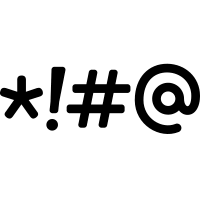 JUST WHAT IS THE BLEEP-ING ISSUE? By Thomas Putnam I was listening to an interview on NPR last night and throughout there were “bleeps” and sometimes even a few “bleeps” in one sentence. From the context I could surmise what word was being bleeped out and was reminded of some discussions with the cast and crew of GRAND HORIZONS. We have discussed whether we think some people will be offended by the language and descriptions in the script of this very funny and thoughtful play. One cast member indicated they knew many people whom she thought would be offended. The question I've been asking in this regard is “Why?” What is it about certain words (or descriptions of certain acts) that causes offense? In the case of certain words, is it that we have been brought up to believe that particular words are inherently bad or are so crude that civilized people don't utter them? Historically we could have gotten our mouths washed out with soap if we were caught uttering certain words. So, who decided which words were mouth-washable worthy? I remember sometime in fifth or sixth grade that John Hershey who lived down the block from me treated me to a long list of words that had never been uttered in my household. He was quite proud of being able to rattle them off, and I'm not sure if he expected me to hold him in higher esteem for being so “grown up” or what. Maybe he needed to prove his worldliness due to the fact that he was a P.K. I don't use—at least not often—the main word that is bandied about fairly frequently in Bess Wohl's comedy GRAND HORIZONS. I seem to have used it (with all of its multiple parts of speech iterations) more often in the past few years than I have in my whole life, but I'm increasingly more puzzled why we are offended so much by it. Here's a Googled explanation: “The act of taking offense, or feeling offended, often occurs due to an experience of negative emotions. These negative feelings and emotions are often caused by a word, action, or statement that conflicts with our expectations and what we believe to be the right behavior, in a moral and acceptable sense.” Moral? Some of the most “moral” people I know use words that many would find offensive. I think the latter concept above is perhaps more to the point: “a word, action or statement that conflicts with...what we believe to be the right behavior in an acceptable sense.” Our own constructs of what we deem acceptable. I grieve that some people will not experience the joy and laughter and thoughtful explorations that are found in this play, due to feeling like it will be offensive and consequently not attend. I hope people will come regardless and join in the talk-backs following all but the first performance. I simply don't know recently what people will find offensive: divorce, certain bleep-ing words, a description of a particular sexual act, a kiss (does it depend on who is doing the kissing and with whom?) I remember that in the play THE MIRACLE WORKER the aunt of Helen Keller cannot use the word “leg,” and uses instead “a lower extremity.” I remember my mother saying that until she was in high school she was not allowed to use the word “pregnant.” I'm not trying to convince anyone to change their speech habits/patterns or to be less sensitive to what conflicts with what they believe to be the right behavior in an acceptable sense. I'm simply continuing my dialogue regarding the question “What is the bleep-ing issue?” I ask this not in a snarky way, but in a genuinely interested way. I hope to see you at the show...and let's talk.
0 Comments
Leave a Reply. |
Archives
July 2024
|
|
Hamilton-Gibson Productions
Providing opportunities for people of all ages to enrich and empower their lives through community performing arts.
OFFICE
29 Water Street, Wellsboro, PA 16901 PHONE 570-724-2079 |

 RSS Feed
RSS Feed